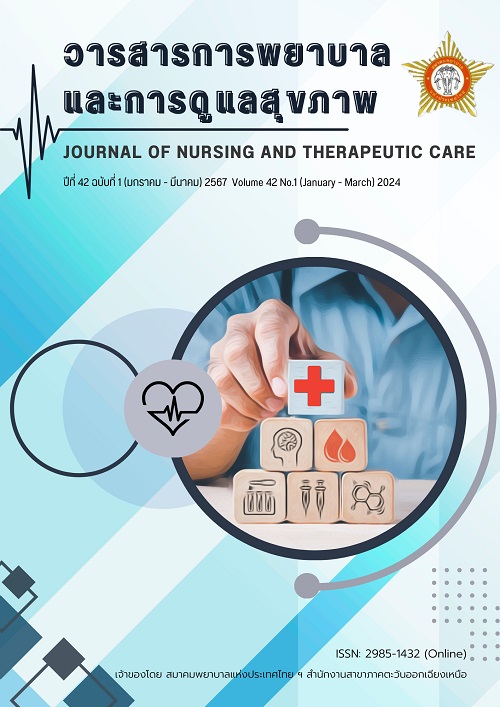ผลของโปรแกรมการส่งเสริมความรอบรู้ด้านสุขภาพต่อพฤติกรรมการจัดการตนเองของผู้ป่วยโรคไตเรื้อรัง
คำสำคัญ:
การส่งเสริมความรอบรู้ด้านสุขภาพ, พฤติกรรมการจัดการตนเอง, โรคไตเรื้อรังบทคัดย่อ
การวิจัยกึ่งทดลองแบบสองกลุ่มวัดก่อนและหลังเข้าร่วมโปรแกรมฯ มีวัตถุประสงค์เพื่อศึกษาผลของโปรแกรมการส่งเสริมความรอบรู้ด้านสุขภาพต่อพฤติกรรมการจัดการตนเองของผู้ป่วยโรคไตเรื้อรัง กลุ่มตัวอย่างเป็นผู้ป่วยที่มีภาวะไตเรื้อรังระยะที่ 3 ที่มารับการรักษาที่ศูนย์สุขภาพชุมชนเมืองวัดใต้ โรงพยาบาลสรรพสิทธิประสงค์ จังหวัดอุบลราชธานี ใช้วิธีการสุ่มอย่างง่ายแบ่งเป็นกลุ่มทดลอง 22 คน และกลุ่มควบคุม 22 คน กลุ่มทดลองได้รับโปรแกรมการส่งเสริมความรอบรู้ด้านสุขภาพเป็นเวลา 8 สัปดาห์ และกลุ่มควบคุมได้รับการดูแลตามปกติ เก็บข้อมูลโดยใช้แบบสอบถามความรอบรู้ด้านสุขภาพ 6 ด้าน ได้แก่ ทักษะความรู้ความเข้าใจด้านสุขภาพ ทดสอบความเที่ยงด้วยวิธีของคูเดอร์-ริชาร์ดสัน 20 ได้ค่าความเที่ยงเท่ากับ .70 ทักษะการเข้าถึงข้อมูลและบริการสุขภาพ ทักษะการสื่อสาร ทักษะการจัดการตนเอง ทักษะการรู้เท่าทันสื่อ และ สทักษะการตัดสินใจ ทดสอบความเที่ยงได้ค่าสัมประสิทธิ์ของครอนบาค เท่ากับ .85 แบบสอบถามพฤติกรรมการจัดการตนเองทดสอบความเที่ยงได้ค่าสัมประสิทธิ์ของครอนบาค เท่ากับ .87 วิเคราะห์ข้อมูลใช้สถิติพรรณนา, Chi-square test, paired t-test, independent t-test
ผลการวิจัย พบว่า หลังการเข้าร่วมโปรแกรม กลุ่มทดลองมีค่าเฉลี่ยคะแนนความรอบรู้ด้านสุขภาพ และพฤติกรรมการจัดการตนเองมากกว่ากลุ่มควบคุมและมากกว่าก่อนเข้าร่วมโปรแกรมอย่างมีนัยสำคัญทางสถิติ .01 ผลการวิจัยแสดงให้เห็นว่าโปรแกรม การส่งเสริมความรอบรู้ด้านสุขภาพ มีผลต่อพฤติกรรมการจัดการตนเองของผู้ป่วยโรคไตเรื้อรังในทางที่ดีขึ้น ดังนั้นจึงควรนำโปรแกรมการส่งเสริมความรอบรู้ด้านสุขภาพมาใช้ในการดูแลผู้ป่วยโรคไตเรื้อรังและผู้ป่วยโรคเรื้อรังอื่นๆในศูนย์สุขภาพชุมชน
Downloads
เอกสารอ้างอิง
Bikbov B, Purcell CA, Levey AS, Smith M, Abdoli A, Abebe M, et al. Global, regional, and national burden of chronic kidney disease, 1990–2017: a systematic analysis for the global burden of disease Study 2017. The Lancet. 2020;395(10225):709–33.
Centers for Disease Control and Prevention. National chronic kidney disease fact sheet. In: U.S. Department of Health and Human Services, ed. Atlanta, GA: Centers for Disease Control and Prevention; 2017.
United States Renal Data System. 2016 USRDS annual data report: Epidemiology of kidney disease in the United States. In. Bethesda, MD: National Institutes of Health, National Institute of Diabetes and Digestive and Kidney Diseases; 2016.
The Nephrology Society of Thailand. Clinical practice recommendation for the evaluation and management of chronic kidney disease in adults. Bangkok: Srimuang Printing Company Limited; 2022. (in Thai)
Wat Tai medical care unit. Summary of operating results for the year 2023.Ubon Ratchathani: Wat Tai medical care unit; 2023. (in Thai)
World Health Organization Health Literacy and Health Promation. Definitions, Concepts and Examples in the Eastern Mediterranean Region. Conference Working Document. 7th Global conference on health promotion. Nairobi, Kenya; 2009.
Inthakamhaeng A. Health literacy: measurement and development. Bangkok: Sukhumvit printing; 2017. (in Thai)
Sarin S. The effectiveness of a health literacy development program in patients with type 2 diabetes risking to chronic kidney disease. Nursing Journal of the Ministry of Public Health. 2014;29(2):64-73. (in Thai)
Phuttimanee T. Effect of PITS-Based education to enhance health literacy on self-management among older persons with chronic kidney disease stage 1-3. [master’s thesis]. Chiang Mai; Chiang Mai University; 2023. (in Thai)
Vesga JI, Cepeda E, Pardo, CE, Paez S, Sanchez R, Sanabria RM. Chronic kidney disease progression and transition probabilities in a large preventive cohort in Colombia. Int J Nephrol. 2021;(2):1-9.
Schrauben SJ, Cavanaugh KL, Fagerlin A, Ikizler TA, Ricardo AC, Eneanya ND, et al. The relationship of disease-specific knowledge and health literacy with the uptake of self-care behaviors in CKD. Int Report.2020;5(1):48-57.
Nutbeam D. The evolving concept of health literacy. Soc Sci Med. 2008;67(12):2072-8.
Sonjai W. The effects of self-management on health behaviors and kidney function of patients with chronic Kidney injury Stage 3. Journal of health science research. 2021;15(3):120-32. (in Thai)
Health Education Division. Strengthening and evaluating health literacy and health behavior among children and Youth (age 7-14 years), group of people aged 15 years and over, revised edition 2018. Department of Health Ministry public health;2018. (in Thai)
Hongsamsipjed T, Insrichuen S, Puakluang W, Rithisart R. The effect of health literacy enhancement program on preventive renal failure in older persons of risk groups. Journal of Graduate MCU Khon Kaen Campus. 2022; 9(3):220-30. (in Thai)
Taweebut P, Kerdmongko P, Amnatsatsue K. The effect of a supportive-educative nursing program for chronic disease patients with early stage kidney disease. Journal of Public Health Nursing. 2017;31(1): 129-45. (in Thai)
ดาวน์โหลด
เผยแพร่แล้ว
รูปแบบการอ้างอิง
ฉบับ
ประเภทบทความ
สัญญาอนุญาต
ลิขสิทธิ์ (c) 2024 วารสารการพยาบาลและการดูแลสุขภาพ

อนุญาตภายใต้เงื่อนไข Creative Commons Attribution-NonCommercial-NoDerivatives 4.0 International License.



